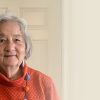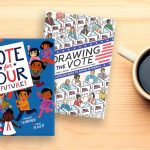Rex Ogle’s debut Free Lunch won the 2020 YALSA Excellence in Nonfiction Award and received several starred reviews. In the book, Ogle uses his remarkable storytelling skills to chronicle his first semester of sixth grade, as part of a family trapped by poverty and with parents who channeled their feelings of failure into abuse. Ogle also illuminates what life is like for a child struggling with hunger and with the humiliation of daily having to state that he’s on the school’s free lunch program. And yet for all the grim reality, Ogle also shows young readers that there are reasons to keep hope alive.
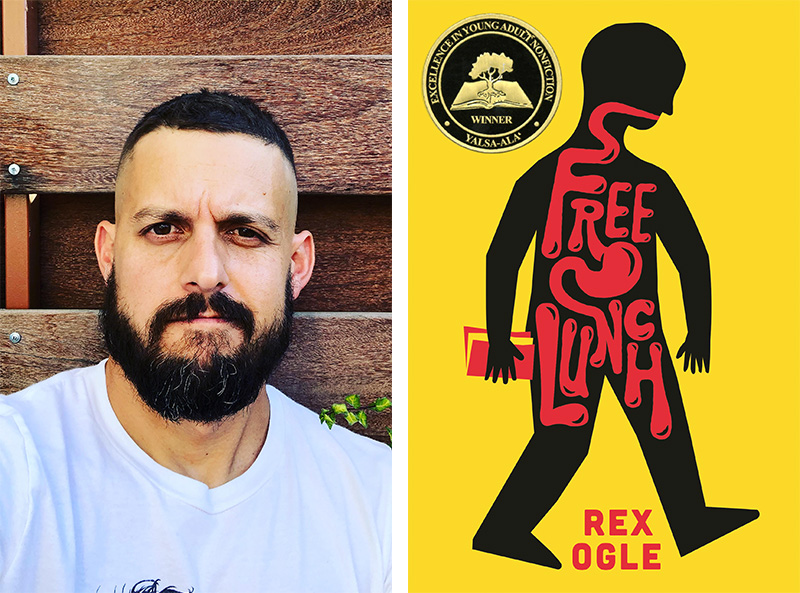
Free Lunch Discussion Guide
Check out “Free Lunch: Extras” to learn more about Rex Ogle and to find discussion questions, writing tips, and further resources to address hunger, domestic abuse, and some of the other topics that may come up during classroom discussions.
Through your personal story, readers experience what it’s like to go hungry, to survive abuse, and to face the obliviousness or prejudice of adults who are supposed to be in your corner. Those are tough things for anyone to face, especially a child. Is the world any different now than when you were younger?
So many people still live with poverty and violence. The world has changed, but not nearly as much as I would like. I do think that services and organizations are more accessible thanks to the internet and mobile phones, but I still think the masses need to be educated about how their neighbors might be suffering. That’s a large part of why I wrote Free Lunch in the first place.
“Sometimes you just have to will yourself forward, like climbing a mountain—putting one foot in front of the other until you have a better perspective.”
Was there a defining moment when you realized your family was poor?
A few actually! The earliest was the first day of second grade. A girl looked at my school supplies and loudly noted, “You only have the 8-pack crayons? I have 152!” My mom hadn’t been able to afford anything but the bare minimum, so that’s what I got. But it wasn’t until middle school and junior high that I really struggled with not having brand name clothes or the ability to pay for my lunch.
You bring your story to vivid life with an amazing degree of detail, which gives Free Lunch a deep sense of authenticity. How were you able to recreate so many specific memories? Did you keep journals in sixth grade? Did you call on friends or relatives to fill in any blanks?
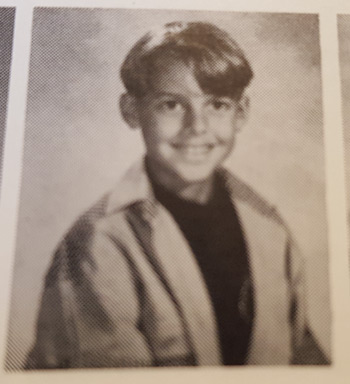
Rex Ogle in 6th Grade
I’ve always been lucky to have an incredible memory. I still recall every single Star Wars action figure I did (and didn’t) have, the layout of every apartment I’ve ever lived in, and even a few bits and pieces from growing up in Guam and Okinawa when I was 3-4 years old. And of course, some of the more difficult memories are branded into my mind like an insect trapped in amber.
To help create an authentic voice, I meditated on old memories for hours, listening to music and watching my favorite shows and movies from that time, and really pushed myself to return to being that kid. I threw myself backward into my past and dredged up as many uncomfortable and visceral details as possible to make the story read as a lived experience. I also asked my friends and a few relatives a lot of questions to verify or confirm certain details. I’ve kept journals since I was pretty young. Unfortunately, I left them behind when I moved out at 16, and my mom burned most of them along with photos of me as a kid.
“Having my own tragic circumstances, I needed healthy role models with moral compasses to encourage me to strive to be a better person.”
Comics were an important part of your life in Free Lunch. What do you think draws kids to this medium? Are you encouraged by the number of educators and librarians who are now advocates for graphic novels and other books that feature this approach to storytelling?
I think it’s absolutely wonderful that adults (be they guardians, librarians, or educators) are finally embracing sequential storytelling. For me, comics were an entryway into new worlds and new genres, each bringing me a much-needed escape from my own reality. And for reluctant readers and youth who would rather be playing video games, graphic novels are a wonderful gateway into reading.
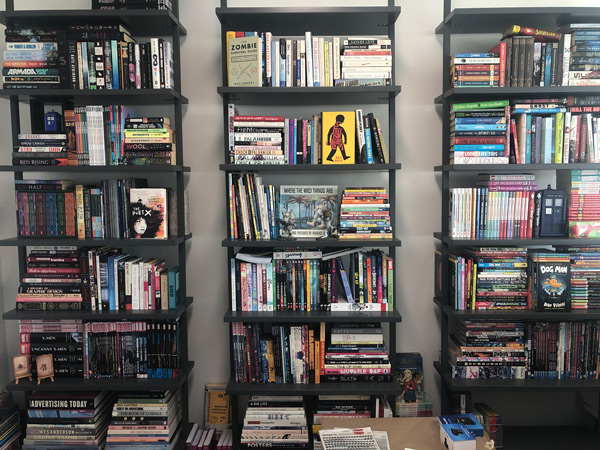
Rex Ogle’s bookshelf
What role did comic book superheroes play in your life?
For me, superheroes were an ideal that I wanted to live up to. Batman used the grief over his parents’ death to become a hero. And having my own tragic circumstances, I needed healthy role models with moral compasses to encourage me to strive to be a better person.
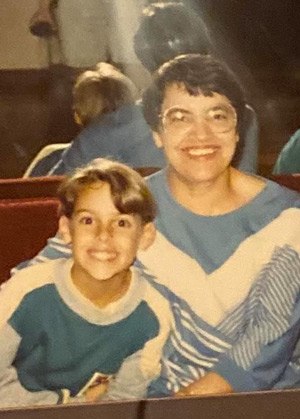
Rex Ogle with his Abuela
I want to make sure that readers know that despite all its difficult elements, Free Lunch also conveys a sense of hope and strongly demonstrates the power of resiliency. Life did get better for you. How did you find your own path out of poverty?
I 100% owe my path to my Abuela. She came from Mexico, from a family with 13 kids, who grew up with dirt floors, under a thatched roof, with no running water. She knew true poverty, and she always impressed on me that education was a means to success. By 14, I was working a job and making straight A’s. In college, I worked two jobs at a time while attending classes full-time. After I got my bachelor’s degree, I fought tooth and nail to chase after the jobs I wanted. It wasn’t always easy, and I’ve had more than my fair share of “no’s,” but I’ve never stopped going after what I wanted. I think it’s about education and stamina—trying to keep your hope and dreams alive, despite the onslaught of rejections. Not always easy, trust me, but sometimes you just have to will yourself forward, like climbing a mountain—putting one foot in front of the other until you have a better perspective.
Why do you think you were able to achieve your hopes and dreams?
Honestly, I ask myself this all the time. What set me apart? Why did I keep pushing myself? I suspect part of it had to do with the death of my sister at an early age, and my desire to live for both of us. I also gained a lot of strength from my Abuela, who always encouraged and supported me. Lastly, I think I grew up with enough adversity that on some level, I wanted to be the opposite of those who brought me up. Surrounded by racism, violence, drugs, alcohol abuse, and more, I desperately pushed myself to walk a different path.
“For reluctant readers and youth who would rather be playing video games, graphic novels are a wonderful gateway into reading.”
Reading your story has to be inspirational for young readers who face challenges of their own—especially when they see all you’ve achieved and realize that it’s worth fighting for their own dreams. Can those readers look forward to more books from you?
Lots! I am currently writing a kind of sequel to Free Lunch, though it takes place in high school and focuses more intimately on domestic violence. It’s called Punching Bag, and it comes out from Norton in the fall of 2021. I also have a trilogy coming out from Scholastic Graphix (which is much lighter fare), as well as several graphic novels under my pen name Rey Terciero, which are mostly classic stories reimagined into contemporary stories or fantasy adventures. Meg, Jo, Beth, & Amy is already out. And, fingers crossed, hopefully, Marvel will let me write X-Men!
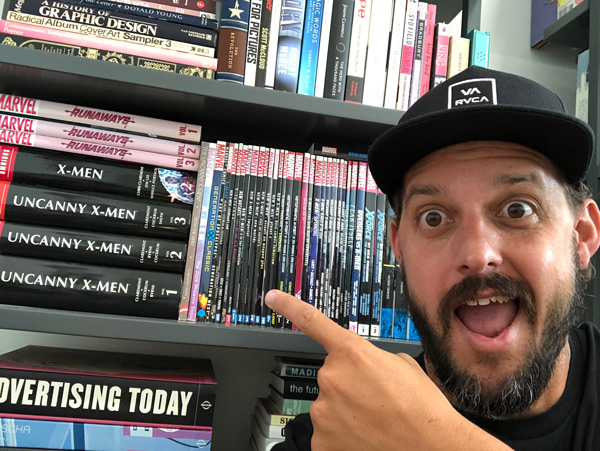
How can fans learn more about you?
I’d say the best way to learn more about me is to follow my Instagram @thirdrex. I just taught myself how to make Instagram stories! I try to keep it light and fluffy, but I recommend books all the time because if I’m not writing, I’m usually reading.



